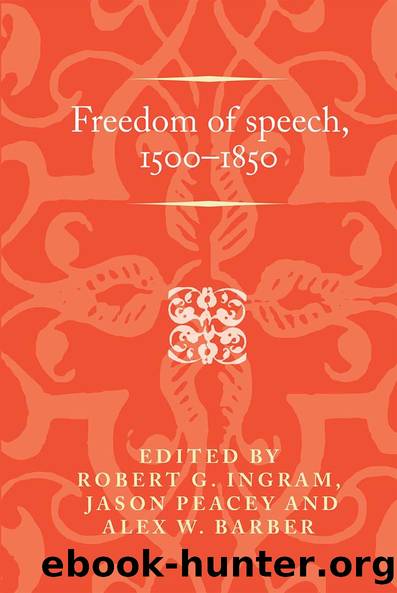Freedom of speech, 1500â1850 by Robert Ingram Jason Peacey Alex W. Barber

Author:Robert Ingram, Jason Peacey, Alex W. Barber [Robert Ingram, Jason Peacey, Alex W. Barber]
Language: eng
Format: epub
Tags: Nonfiction, History, Modern, 17th Century, British
ISBN: 9781526115911
Publisher: Manchester University Press
Published: 2018-07-14T04:00:00+00:00
Chapter 7
Defending the truth: arguments for free speech and their limits in early eighteenth-century Britain and France
Ann Thomson
The title of this chapter may seem surprising in an age when the notion of the truth is a very contested one. However, after a long period in which doubt was cast on the very idea of truth and its existence, with emphasis on the way it was constructed and used by the powerful, one might argue that now, with the appearance of alternative facts and fake news, the notion is due for rehabilitation. This chapter therefore approaches the question of eighteenth-century discussions of the freedom of speech from the angle of the truth. The debate on censorship and the freedom of expression in the seventeenth and eighteenth centuries has been frequently studied, often in the context of a teleological history of the development of our freedoms. But if we wish to abandon a Whig perspective and look at the contradictions in this history, the question of the truth is an enlightening strand on which to focus. It is true that many of the questions raised in what follows became more acute in the later eighteenth century, and of course during the revolutionary period, particularly but not only in France.1 However, it is worth going back earlier to see the tensions running through these issues and the debate around the freedom of the press. Although the focus here will mainly be on England, there are some excursions across the Channel, because the way the English situation and discussions were received, particularly in the very different French climate, helps to throw light on what was at stake in the English debates.
SEEKING THE TRUTH
The starting-point for this study is the period of official toleration and party strife in England after the âGlorious Revolutionâ when some of these questions were particularly acute. In this period, as later, we find many echoes of the Protestant notion of the right to seek the truth, as defended in particular by Milton in Areopagitica. Without the right to think freely and to question the views of others, truth, in particular true religion, could not be found. Even the expression of erroneous views, if part of an honest pursuit of the truth, was an important step on the path to discover it. For this, God has accorded reason to humans. Even if eighteenth-century protagonists are not always defending the same type of truth, their debates are clearly predicated on the belief that the truth exists and can be discovered.
For many who defended the freedom of speech, the enemy was the church hierarchy, who imposed the official version of religious truth, which some critics considered to be mistaken or a corruption of the original revelation of the truth. Those who opposed church doctrine were not necessarily nonbelievers who wished to do away with religion, or âsecularisersâ, or those who believed that science was opposed to religious teaching (although those existed, as we shall see below). Many were simply opposed to the intolerance
Download
This site does not store any files on its server. We only index and link to content provided by other sites. Please contact the content providers to delete copyright contents if any and email us, we'll remove relevant links or contents immediately.
4 3 2 1: A Novel by Paul Auster(12358)
The handmaid's tale by Margaret Atwood(7734)
Giovanni's Room by James Baldwin(7307)
Asking the Right Questions: A Guide to Critical Thinking by M. Neil Browne & Stuart M. Keeley(5745)
Big Magic: Creative Living Beyond Fear by Elizabeth Gilbert(5731)
Ego Is the Enemy by Ryan Holiday(5398)
The Body: A Guide for Occupants by Bill Bryson(5067)
On Writing A Memoir of the Craft by Stephen King(4921)
Ken Follett - World without end by Ken Follett(4711)
Adulting by Kelly Williams Brown(4556)
Bluets by Maggie Nelson(4536)
Eat That Frog! by Brian Tracy(4503)
Guilty Pleasures by Laurell K Hamilton(4428)
The Poetry of Pablo Neruda by Pablo Neruda(4083)
Alive: The Story of the Andes Survivors by Piers Paul Read(4013)
White Noise - A Novel by Don DeLillo(3993)
Fingerprints of the Gods by Graham Hancock(3980)
The Book of Joy by Dalai Lama(3963)
The Bookshop by Penelope Fitzgerald(3829)
